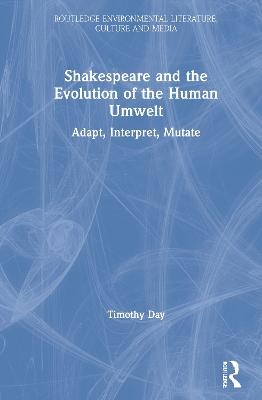
Shakespeare and the Evolution of the Human Umwelt
Routledge (Verlag)
978-0-367-85597-0 (ISBN)
Shakespeare and the Evolution of the Human Umwelt brings together research on Shakespeare, biosemiotics, ecocriticism, epigenetics and actor network theory as it explores the space between nature and narrative in an effort to understand how human bodies are stories told in the emergent language of evolution, and how those bodies became storytellers themselves.
Chapters consider Shakespeare’s plays and contemporary works, such as those of Barbara Kingsolver and Margaret Atwood, or productions for which Shakespeare is a genetic forebear, as evolutionary artefacts which have helped to shape the human umwelt—the species-specific linguistic habitat that humans share in common. The work investigates the juncture where semisphere meets biosphere and illuminates the role that narrative plays in our construction of the world we occupy. The plays of Shakespeare, as works that have had unparalleled cultural diffusion, are uniquely situated to speak to the ways in which ideas and the texts they use as vehicles are always material, always environmental, and always alive. The book discusses Shakespeare’s works as vital nodes in our cultural, historical, moral and philosophical networks, but also as environmental actors in and of themselves. Plays are presented alternately as digitally encoded bits of culture awaiting their connection to an analog world, or as bacteria interacting with living organisms in both productive and destructive ways, altering their structure and creating new meaning through movement that is simultaneously biological and poetic.
This book will be of great interest to students and scholars of ecocriticism looking to model ecocritical readings and bridge gaps between scientific, philosophical and literary thinking.
Timothy Ryan Day teaches Shakespeare, Ecocriticism, and Writing at Saint Louis University's Madrid campus. He was born in Oklahoma, grew up in Chicago, and lives in Spain.
Preface
Acknowledgments
Introduction
Chapter 1- An Education in Naturecultures: Review of Literature on Ecocriticism, Biosemiotics, and Shakespeare
Chapter 2- With Parted Eye: A Midsummer Night’s Dream, Richard Powers’ Orfeo, and Biosemiotics
Chapter 3- Consuming the Slaughter: Applause, Bullfighting, and Fascism in Shakespeare’s Hamlet and Richard Wright’s Pagan Spain
Chapter 4- Co-conspirators: invoking Macbeth in Margaret Atwood’s Oryx and Crake
Chapter 5- Migrations: Butterflies and Shakespeare in Barabara Kingsolvers’s Flight Behavior
Chapter 6- Mutations and Interpretations: From the Tempest to La Otra Tempestad
| Erscheinungsdatum | 24.02.2021 |
|---|---|
| Reihe/Serie | Routledge Environmental Literature, Culture and Media |
| Verlagsort | London |
| Sprache | englisch |
| Maße | 156 x 234 mm |
| Gewicht | 453 g |
| Themenwelt | Geisteswissenschaften ► Sprach- / Literaturwissenschaft ► Anglistik / Amerikanistik |
| Geisteswissenschaften ► Sprach- / Literaturwissenschaft ► Literaturgeschichte | |
| Geisteswissenschaften ► Sprach- / Literaturwissenschaft ► Literaturwissenschaft | |
| ISBN-10 | 0-367-85597-6 / 0367855976 |
| ISBN-13 | 978-0-367-85597-0 / 9780367855970 |
| Zustand | Neuware |
| Haben Sie eine Frage zum Produkt? |
aus dem Bereich


